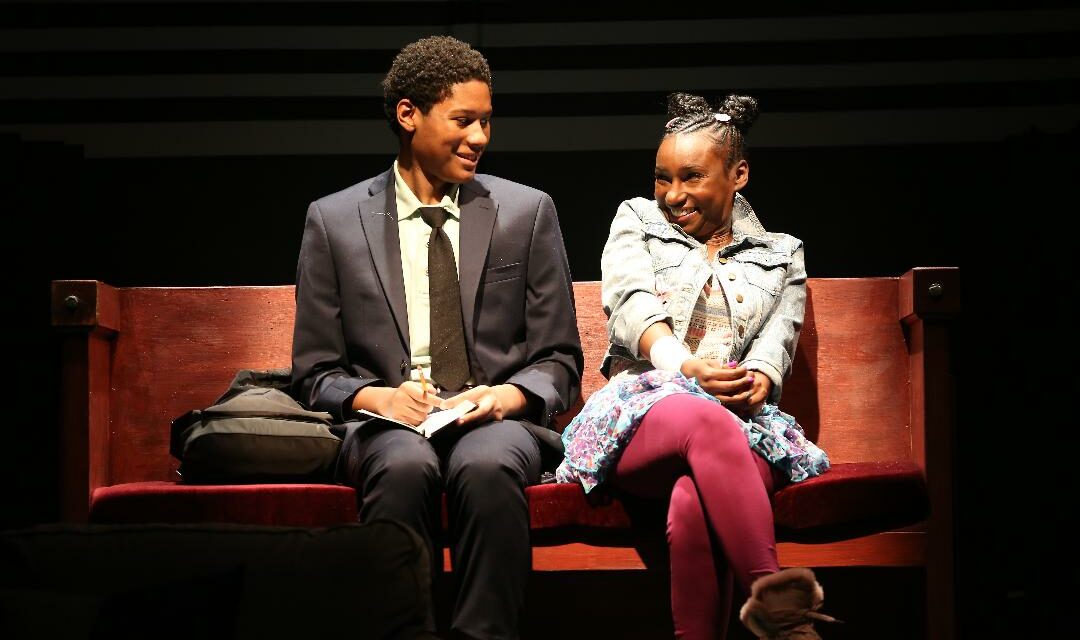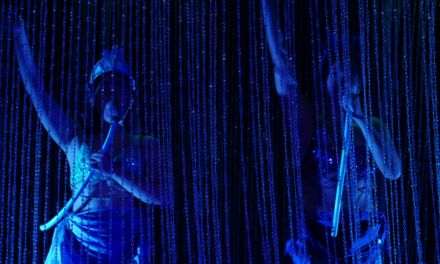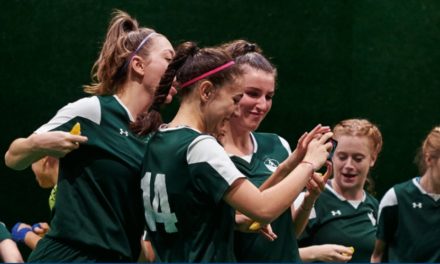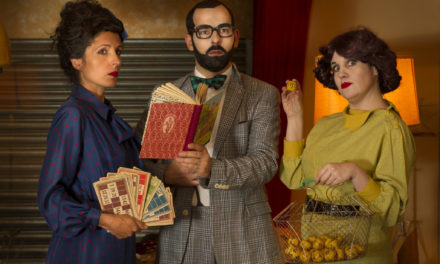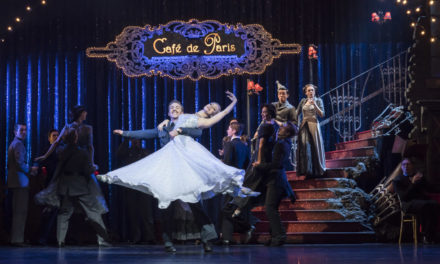Playwright Chisa Hutchinson‘s Surely Goodness And Mercy follows 12-year-old Tino, an orphan living in the city of Newark, New Jersey, who goes in search of a community and finds one, with the help of some friends along the way. Tino’s journey involves the real-life Newark non-profit organization New Jersey SEEDS, which connects high-achieving students from low-income households with educational opportunities.
Chisa herself grew up and currently resides in Newark. As a child, she was in the first graduating class of SEEDS in 1994, and has been involved with the organization in her adulthood, as a mentor and teacher.
Following a 2017-18 National New Play Network rolling world premiere, Surely Goodness And Mercy is receiving its New York premiere off-Broadway this spring at Keen Company, where I serve as Director of New Work.
Given this production’s proximity to Newark, and the importance of that community to both Chisa and her play, Keen Company sought to build a relationship with SEEDS. We wanted their staff and alumni to see this production, and we also sought to come together for a conversation about Newark, this play, and finding the people and places that make us feel valued.
SEEDS was immensely supportive of this idea. After a little planning, Chisa sat down with Keen Company Artistic Director Jonathan Silverstein, SEEDS Vice President of Admissions and Placement Andy Hoge, and recent SEEDS alumnus Abdiel Perde, currently in seventh grade at Delbarton School in Morristown.
This conversation served as the launch of a relationship between Keen and SEEDS, which will continue with a group trip to see the show, and–we hope–beyond.
PART I: THE PLAY
Q: What were your impressions of the play after you read it for the first time?
ABDIEL: I was very surprised. I’ve never read anything like it.
ANDY: It resonated with me. I really connected with it emotionally. I’ve been here at SEEDS for 17 years, so throughout the play I was putting faces of different people I’ve come across onto some of the characters.
JONATHAN: Keen Company is very much about telling stories people can identify with. And I was really emotionally moved by the story all the way through; I really felt for Tino. Also, I’ve got to say I was really surprised how much I connected with the church scenes, because that’s not part of my upbringing, and I really understood it and appreciated it and was moved by it.
ABDIEL: I love the pastor character. Where did you get the inspiration to write about him?
CHISA: I grew up in a Pentecostal church. There was a lot of focus, at least where I was, on what not to do. There were all these constricting rules that didn’t sit right with me. And the more I thought about it, the more I wondered, why does this need to be this way? I grew up and I fell away from the church.
Then I taught at a Quaker boarding school when I got out of college. It was like, there isn’t some guy standing at a podium wagging his finger at us, telling us everything we’re doing wrong? It was eye-opening. And I started paying attention to people who really value or practice religion, and seeing how they operate in their lives. And the people that I have the most respect for are the ones who have faith but they don’t try to beat other people over the head with it. They’re just living and sort of preaching by example. So when I sat down to write this play, I wanted to nod at those people who use religion as a tool for good, to inspire people, to create good and positive energy. So this preacher is not based on anyone in particular, but he is the preacher that I wish I had had when I was growing up.
ABDIEL: Why did you make Tino’s life so difficult? Was it because of how you grew up, or what you’ve seen in movies, or what you think people want to see?
CHISA: I grew up in a household where just trying to provide the bare necessities really took all the resources my mom had. When you work three jobs you don’t have time to reason with your kid. You don’t have time to make sure they did all their homework. Anything else is like, “I don’t have the time.” It’s just, “you’re not going to do that again or I’m going to smack you upside your head.” I see it still, all over this city, just walking down the street. A little kid is not paying attention as they’re walking across the street and there’s none of this gentle mom-arming, it’s like, I’m going to grab you by your collar and yank you back. It’s almost like an act of violence, but it’s out of love, it’s a protective gesture. And then it will be followed up with [laughing], “stupid! I taught you to look both ways.”
I think it’s easy for people to misconstrue it as pure violence, or to look at it and say, “oh, I would never do that to my child,” or “they’re wrong,” or whatever it is. I beg to differ. I think that that love–that sort of hard love–is just as valid and it’s just as strong and deserves a place on the stage.
[When] this play was commissioned by NJPAC and Writers Theater of NJ, the only guideline I was given was it had to be about a community in New Jersey. And of course I’m going to choose Newark. The biggest challenge I had writing it was trying to convey that there’s this hard shell and yeah, the people can come across as abrasive or harsh, but there’s love bubbling underneath and generosity, and I wanted to honor that and I wanted people to understand that this is a place where you can find softness if you know where to dig, and where you can find love, it just won’t look like it does in the Hollywood movies or whatever.
PART II: THE NJ SEEDS EXPERIENCE, AND STAYING CONNECTED TO NEWARK
Q: Abdiel and Chisa, can you talk about your school experiences, in Newark schools and then after SEEDS placed you into other schools?
ABDIEL: I came from a very small school in Newark–it only had 83 students. I had been there since kindergarten, and they had to close down the middle school last year because they didn’t have enough funding. That was difficult because I had so many friends there, and then I left to go to a different school community that I didn’t know. The first day, you could see everybody else had connections to each other, and how you could feel left out. It was challenging to find friends and people I could talk to, but people were actually very nice at the school. You feel like you’re going to be the outcast, and it was comforting to see people want to talk to you and know your name and where you come from and stuff like that. And the work was challenging as well, because it was different from what I’ve encountered before. But it was a good challenge.
The transition to my new school was easier because of SEEDS and because of family. For example, in your play, Tino doesn’t really have anyone on his side except the lunch lady and Deja. I have people around me to support me and help me find comfort.
CHISA: SEEDS does a really good job of supporting you through that culture shock, and checking in with you and making sure everything is cool. Because I went to school in Newark, I didn’t have all that much exposure to people who were not Black or Latino. And so when [SEEDS placed me in] Kent Place School–which is majority white–it feels like you’re colonizing another planet.
ANDY: It’s interesting hearing these different views from 26 years ago and 2 years ago. I’m glad to say we [at SEEDS] have learned a lot in that time, but still the heart of it is: this kid needs help, what can we do? We’re strapped for resources, we’re strapped for time, but we still figure out ways of making it happen. But yes, even with 14 months of academic and social preparation, 500 or 600 hours of exposing kids to what’s next and how to get there, there is still that–how did you just describe it?–going into the alien territory that’s going to be experienced by our kids.
ABDIEL: I remember the first time we talked about it. That we’re going to feel different because we don’t know anyone or because of our skin color. You hear that a million times but it never really sets in until you actually experience it.
ANDY: And then when you do experience it, what tools do you have at the ready to get through that?
CHISA: And yes, there’s the academic preparation and the actual wrangling of scholarships for kids, but there’s this whole other level–you know, oh you’re clearly not eating enough so we’re going to bring in a little extra food. Or you can’t afford to get to where you’re going so I’m going to drive you. [SEEDS staff] is just there for you in a way that’s certainly not part of their job description.
ABDIEL: I know you were IN the first graduating class of SEEDS. How was that experience?
CHISA: I didn’t really think it would lead anywhere. It was just, oh I’m going to learn some stuff. It wasn’t until we started applying for admission to different schools that I was like, oh right, this program could take me someplace entirely different.
My mom didn’t want me to go [to Kent Place]. She was working as hard as she could. She had a 6th grade education and by all the traditional markers wasn’t a particularly successful person and wasn’t going to get too far in life–I’m using air quotes–but she was doing the best she could. And for me to be like, thanks, but I’m going to go over here now because all of the things you’re doing are not enough–had to be a slap in the face for her. I still feel some kind of way about that, I feel some kind of guilt about having to look elsewhere.
I spent so much time trying to claw my way out of Newark. The messaging was that this was a terrible place to be. I was so grateful for SEEDS plucking me out and plopping me down into some place where I had more opportunities. And I still am grateful, but over the years I’ve come to question why there aren’t just opportunities everywhere for everyone? And in this way I’m looking forward to the day when there is no terrible place for people to be plucked from, and there are opportunities aplenty.
PART III: EXPOSURE TO THE ARTS
ABDIEL: I’m not an art student, I’m not good at art. That’s not what I do. SEEDS showed me that there’s the academic side, but there’s also the artsy side. A lot of people like to think that because you’re in SEEDS you’re supposed to be smart smart smart. You’re not supposed to do all this other stuff. And then SEEDS comes along and is like, “yeah you can be smart but at the same time you have to work at other things.” [SEEDS also took us] to see Aladdin. That was so cool, it was the first time I’ve ever been on Broadway and the first time I’ve ever been in Times Square. The play was beautiful and the effects were all so nice. Everything locked in together. You could tell they studied so hard and they practiced so much.
CHISA: Do you act?
ABDIEL: Yes, I act. I acted in a musical through Faith Center of the Arts. I’m thinking about doing it again this summer. It’s challenging in a lot of ways, but it’s amazing. Being in the play rather than being on the other side, in the audience, it’s so cool.
CHISA: What was your favorite part?
ABDIEL: The dancing, actually. I’m not a dancer. I can’t dance. So being choreographed, and when you actually see it on video, it’s like “wow, that was me!” You know what I’m saying? It’s so cool to see it all come together. [To Jonny] Like you, I know that you’re a director. You’ve seen so much of it, but you have to be surprised at the end when you see how everything comes together.
JONNY: Of course.
ABDIEL [To Chisa]: And you, you write the play, but when you finally see people watching it, it’s a totally different experience.
PART IV: TAKING CARE OF EACH OTHER AND CREATING COMMUNITY
Q: This play tells the story of someone vulnerable who desperately needs something, and finds a way to get it, with the help of some key people and communities. Can you tell us about the people and organizations that have served that role for you?
ABDIEL: Definitely my parents–I know they love me and support me. They’re the ones who brought me to NJ SEEDS, and help me get other places I might want to go, that I might not be able to get to otherwise. I could also say my church is a safe haven, because whenever I have a problem there’s always somebody there to talk to. It’s not every day you can find someone who’s waiting for you to tell them about your problems, so when you find that type of place it’s something you really want to hold onto.
ANDY: It was the church that opened my eyes up in high school that the world outside the suburbs was cruel to a lot of people, even if it wasn’t cruel to me. And so I [participated in] a lot of service trips, which got me rethinking what my college experience was going to be. It was assumed I would go to college and get onto Wall Street and do my thing there. Who was that character on Family Ties–Alex Keaton? In a lot of ways, I was Alex Keaton, in my head, because of what other people had put into my head about what life was like. The church gave me a redirection, and showed me what social activism could be.
CHISA: Of course, there was SEEDS and the family who took me in after SEEDS [helped me get into Kent Place]. And I had some really great teachers. In sixth grade at Madison Avenue School, Ms. Carlisle-Peters was that first teacher who told me, “hey, you’re really smart and you’re a good writer and you should keep it up.” My theater teacher at Kent Place, Mr. Pridham, paid attention to me in a way that was just encouraging. He was like, “come over here and listen to August Wilson debate Robert Brustein,” or “let’s go see Alan Cumming in Cabaret.” He presented to me all these extraordinary opportunities without explaining why he was singling me out as the recipient for them. It didn’t occur to me until later on that he was really trying to nudge me in a particular direction.
JONNY: For me, it’s been theater. I was in a children’s theater starting at eight years old, and there was a woman who taught there who really treated us like adults. And she was the first person who said to me, “you’re good at this.” She created an environment where everyone who was different could be together, and she made me feel comfortable for the first time.
I always found that encouraging others is the most productive thing that one could do, and that every person has something to offer and greatness can come out of them. At Keen we like to make everyone feel valued and that they have something to bring to the table. That was instilled in me by the woman who ran my children’s theatre: the way to create the best work–and I don’t just mean art work–is to be talked to like we’re all humans, and smart, and we all have something to offer.
ABDIEL: That’s such an amazing thought. I didn’t think about it like that, but that’s so true. Like, I have my little brother, right? He’s so smart. When he’s talked to like he’s a little kid, that’s when he zones out. He needs to be spoken to like he’s a human, like you said, like he’s a person too, and he can understand what you’re saying. It’s kind of weird sometimes, because he is a little kid though. But he wants to be treated like everyone else. “Why are you going to speak down to me?” I love that.
CHISA: In an abstract way, when I write I set out to do what Jonny describes: creating space for people to come in and feel invited. To make space inside of the play for the audience. Maybe not always for them to be comfortable, because I do like to challenge people sometimes, but valued–I love that word.
This post was written by the author in their personal capacity.The opinions expressed in this article are the author’s own and do not reflect the view of The Theatre Times, their staff or collaborators.
This post was written by Jeremy Stoller.
The views expressed here belong to the author and do not necessarily reflect our views and opinions.

